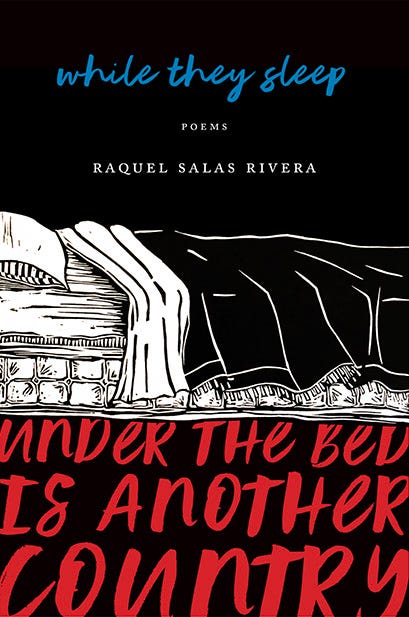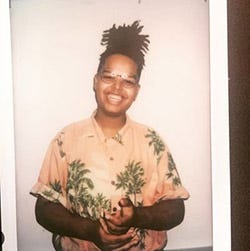Choice of the Past, The Choice of the Present: Kaja Rae Lucas on Raquel Salas Rivera’s “while they sleep (under the bed is another country)”
Puerto Rico, after battles over aid — largely propagated by President Trump — was left alone to handle the damages of Hurricane Maria. Raquel Salas Rivera’s new book, while they sleep (under the bed is another country) is the antithesis to an exhibitionist donation call, it is a distinct and politically clear understanding of the aftermath of this ecological and sociological disaster. This book exists in the lived and not in the reported.

Salas Rivera deals in a distinct image that dons the cover and the structure of many of this book’s pages. “under the bed” is the footnote, that delineates the seen from the unseen. The shift from English to Spanish to create balance — a balance of the worlds, a balance of the lived experience. Puerto Rico is rendered the Other country — simultaneously demonized and elevate in the US media, both part of the US and at odds with the mainland — straddles what is meant by “our people” and “our enemy.” Yet, Salas Rivera makes it clear that the argument of who “our people” are is merely a colonial idea. The history of Puerto Rico does not entail choice to be a US colony, but rather, the literal seizing and occupation of the nation. The US majority’s claim of who “our people” are, as Salas Rivera points out in their text, is assumed without the consent of Puerto Rican people.
The “experiential dysphoria,” as Salas Rivera terms it, undergirds the position of Salas Rivera as the poet. They are the person who translates, both linguistically and poetically, the experience, and they admit “to translate is to be the illegible witness of oneself.” And Salas Rivera’s self becomes the “many family members they have” that look like them. The connection is tangible and this physicality of the book allows for the narrational pieces — which take up perhaps a couple lines on many pages, not including the bottom portion that stands as the “under the bed” — to become more than “performative.”
The duality of the “under the bed” portions and the text above brings a clarity to not only the relationship between Puerto Rico and the US but the dualism of US imperialism. The US maintains an image of itself rooted in “democracy” and humanitarian aid while killing its own people and leaving the citizens of its colonies to die because it’d be too costly to assist them. “Another country” is also the US to Americans, and the US to everyone else.
Salas Rivera takes their time to examine and deconstruct the ways people responded. On one page, they write “i / have / no. / words” and this is followed by pages of “let us know how we can help” and “i can’t even begin to imagine / what you are going through.” The poet is working through the performance of sympathy, which begins and ends in words, not action. These poems do not end in words, however, they work in experience, in telling, in the primary understanding of the human lives affected, so that we may move forward, rejecting colonialism.
The question becomes: “what is a record / if not a scar / as long / as a coffin.” We will be facing many of these records, these coffins, the personal accounts of the disaster of both colonialism and climate change — which are inextricable — and this book becomes a signal fire in its explanation of the trauma that damaged Puerto Rico and its people. Salas Rivera is creating a history at the end of history. They have pulled a political history as well, and perhaps even more pivotally. They are disrupting the order that allows for the US to “only hear echoes of their own good deeds.” Salas Rivera pulls apart the temporal, that both history and future are contained within the choice of people. This is, definitely, what Salas Rivera deals in most: people.
In the poem “note for a friend who wants to commit suicide after the hurricane,” Salas Rivera proves this idea that the future is not merely something we see as “realists” or “visionaries.” People see the future in their lives, in the rooted, lived things, things that will carry on. The future is not an abstract to Salas Rivera, and it should not be for anyone: the world will survive us, and our habits will survive us. There will still be the “buenos dias, there is coffee” of which Salas Rivera writes.
The only thing worth hoping in is experience, is the destruction of the structures that support death. “If you love death so much / why don’t you marry it?” Salas Rivera writes in the first pages. The dark of the book is the knowledge that the colonial structure is rooted in death to maintain it. It decides who gets to live, who gets to die. Who gets meaningful aid, who gets cans of beans. But there is a future — and it is not an ahistorical one. The future is contingent on the choice of the past, and the choice of the present. Salas Rivera has written a book that is alive in both its politic, and its care, its forceful telling of truth.

Kaja Rae Lucas is a poet and writer from Baltimore, Maryland. She is a member of the 2019 Baltimore City Youth Poetry Team. Find her work in Cosmonauts Avenue, Necessary Fiction, and elsewhere. She is the author of (beamphrase) (circles) from the 2019 Damaged Goods Chaplet Series.
Review: while they sleep (under the bed is another country), by Kaja Rae Lucas was originally published in Anomaly on Medium, where people are continuing the conversation by highlighting and responding to this story.
